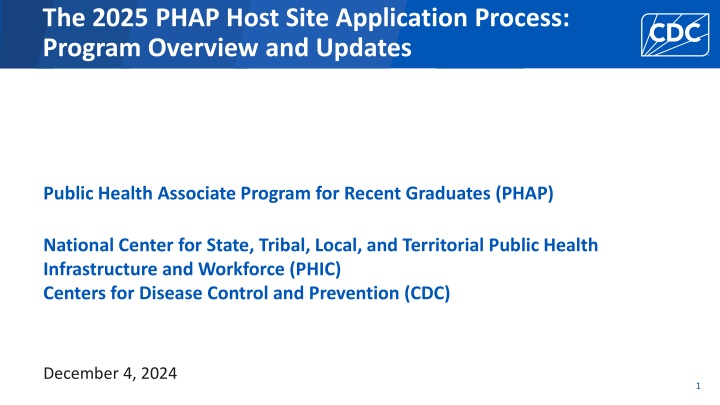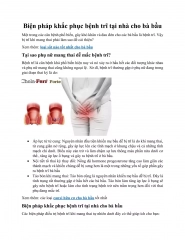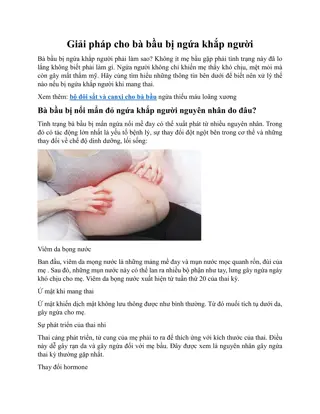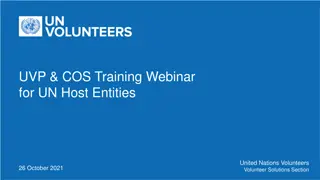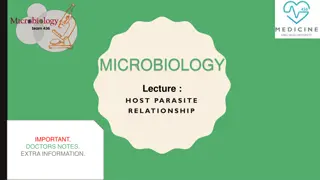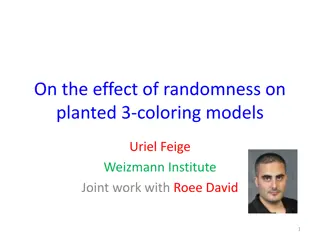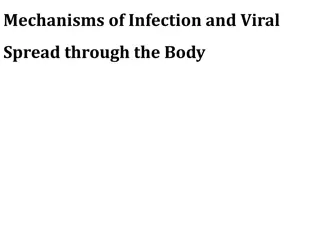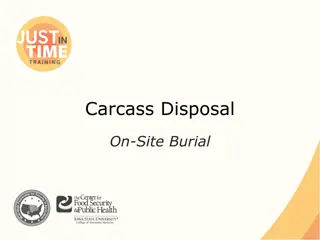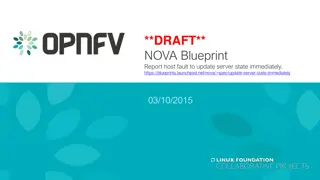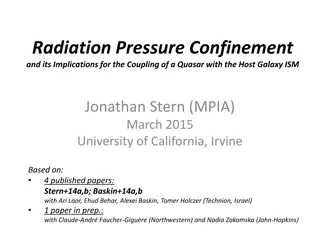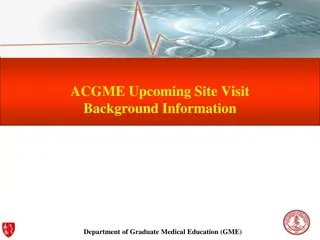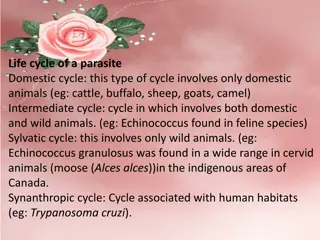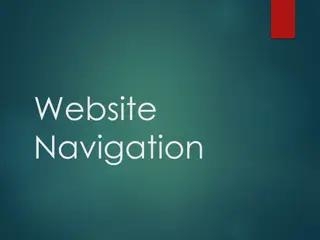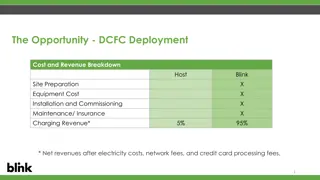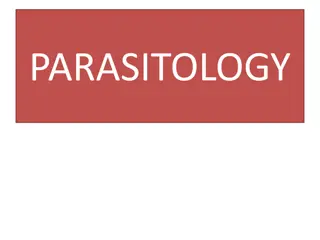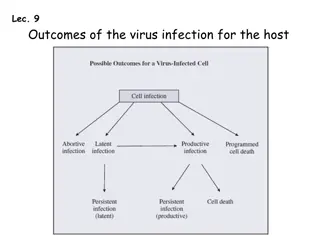2025 PHAP Host Site Application Process Overview
This document provides an overview of the 2025 PHAP Host Site Application Process, including key timelines, program details, and application procedures. Learn about the PHAP program designed for recent public health graduates, the application submission and selection process, session agendas, and what PHAP entails for early-career professionals. Discover the program's structure, requirements, and partnerships with various health departments and organizations.
Uploaded on Mar 16, 2025 | 1 Views
Download Presentation

Please find below an Image/Link to download the presentation.
The content on the website is provided AS IS for your information and personal use only. It may not be sold, licensed, or shared on other websites without obtaining consent from the author.If you encounter any issues during the download, it is possible that the publisher has removed the file from their server.
You are allowed to download the files provided on this website for personal or commercial use, subject to the condition that they are used lawfully. All files are the property of their respective owners.
The content on the website is provided AS IS for your information and personal use only. It may not be sold, licensed, or shared on other websites without obtaining consent from the author.
E N D
Presentation Transcript
The 2025 PHAP Host Site Application Process: Program Overview and Updates Public Health Associate Program for Recent Graduates (PHAP) National Center for State, Tribal, Local, and Territorial Public Health Infrastructure and Workforce (PHIC) Centers for Disease Control and Prevention (CDC) December 4, 2024 1
Welcome Heidi Davidson, MPH Team Lead, PHAP Data Management Team (DMT) Field Services Workforce Branch (FSWB) Division of Workforce Development (DWD) National Center for State, Tribal, Local, and Territorial Public Health Infrastructure and Workforce (PHIC) Centers for Disease Control and Prevention (CDC) 2
Session Agendas Webinar #1: Wednesday, December 4, 2024 @ 2:00PM ET PHAP Class of 2025 Host Site application timeline PHAP program overview Characteristics of a quality host site application (CO-STARR model) PHAP Host Site application submission and selection process eFMS 3.0 and program updates / new requirements for host sites Webinar #2: Thursday, January 23, 2025 @ 2:00PM ET PHAP Host Site application portal demonstration (eFMS 3.0) 3
Overview of the 2025 PHAP Application Timeline March through mid- April April through May Early January February 3-28 Early summer Late summer Mid- October Associate application period in USAJOBS Host site application period Closes at 5:00 pm (EST) on 2/28 Host site application review process Associate personal statement & interview processes Selection and matching of associates and host sites Offers extended to associates Host sites notified Associates first day at PHAP host sites 4
What is PHAP? Two year, paid, competency-based training program for early-career public health professionals - Associates are federal government employees while in PHAP - Associates are assigned to one host site and work in one subject/program area - Associates gain hands-on experience in public health programs and service delivery CDC partnership with host sites - State, tribal, local, and territorial health departments and nongovernmental organizations PHAP is NOT - An internship - Administrative staffing support - A program that provides host sites with CDC subject matter experts 5
PHAP competency domains 1.0: Analytic and assessment 2.0: Public health science 3.0: Program planning, management, and improvement 4.0: Public health policy and law 5.0: Professionalism 6.0: Communication 7.0: Health equity 8.0: Community dimensions of public health 9.0: Public health funding and budgeting 10.0: Emergency preparedness and response 11.0: Evaluation Full list of PHAP domains and competencies can be found on PHAP s website: https://www.cdc.gov/phap/media/pdfs/PHAP_Competencies_2023_02_15v3.2.pdf 6
Three-legged stool concept of PHAP goals 1. Host site benefits - Hosting an associate increases capacity, provides value-added service - CDC-funded associates are well-rounded, energetic, flexible individuals eager to learn - PHAP is a unique partnership with CDC to develop the nation s next generation of public health professionals Associate benefits - Associates gain experience in onsite public health programs and service delivery - After PHAP, associates are qualified to convert non-competitively to full-time positions at CDC and the U.S. Department of Health and Human Services. Public benefits - Public benefits from the work of the associate at your host organization 2. 3. 7
PHAP Mission The mission of PHAP is to prepare recent graduates to enter the public health workforce, through field experience and structured learning. 8
Is my agency eligible to host a PHAP associate? Many agency types are encouraged to apply to host an associate (only in US or its territories) - State, tribal, local, and territorial public health agencies - Nongovernmental organizations (such as community-based organizations) - Public health institutes and associations - Academic institutions A host site must be able to provide a two-year hands-on learning experience that: - Is suitable for recent graduates with a bachelor's or master's degree with little or no work experience in public health - Will enable the associate to develop proficiency in required PHAP competencies Host sites must identify a primary and secondary host supervisor to provide ongoing day-to- day supervision of the associate Host sites cannot be 100% remote 9
Seven Characteristics of a Quality PHAP Host Site Training Experience Competency-based work plan Opportunities for advancement Supervisor involvement Training, education, and development are ongoing Aligns with host site program goals and strategy Realistic for an early-career public health professional Robust public health learning experience CO-STARR 10
C Competency-Based Work Plan Program structure and work plan should provide opportunities for associate to meet PHAP competencies See, Do, Teach approach Skills and performance; not just observation - Disease intervention specialist - Community education - Collaboration efforts - Health department accreditation - Water sampling - Health promotion - Community needs assessment 11
O Opportunities to Build Skills Associate s work should be progressive to build skills over the two-year training program Activities should build upon each other Provide additional experiences to reinforce acquired skills, for example - Implement a survey assist in data analyses - Interview contacts assist supervisor in managing local disease control efforts - Conduct Directly Observed Therapy assist tuberculosis manager to identify barriers to care - Help conduct immunization assessments interact directly with health care providers 12
S Supervisor Involvement Proximity - Direct oversight of associate s day-to-day work activities - Close to the work the associate will be doing Time commitment - At least 10 percent of time (~4 hours per week) - Can be direct observation, one-on-one meetings, shadowing, email communication, etc. Capacity - Staffing infrastructure of host site can support an associate Experience - Minimum of 2 years experience required - Host site supervisor s skills, supervisory experience (e.g., supervising early-career staff, fellows, interns, students), mentoring, and interest in supervising associate 13
T Training, Education, and Development Are Ongoing Develop a well-rounded training plan for the two-year assignment Three components to a quality training plan: 1. Host site orientation Local regulations, policies, and procedures (e.g., security, use of IT, professional attire, training for ethics, sexual harassment, bloodborne pathogens, HIPAA) 2. Technical training Provide specific knowledge and skills needed to complete work activities 3. Public health and professional education Collaboration among public health program areas Provide broader training of public health concepts, methods, and issues to foster professional growth 14
T Training, Education, and Development (contd) Progressive training and creative opportunities to build knowledge, skill, and ability Include a variety of training methods, including - Instructor-led - Web-based/online learning - One-on-one - Self-paced study - Independent study 15
A Aligns with Host Site Goal Associate s work should support your effort to meet your program goals Ask: How can an associate s work activities supplement our efforts to meet our goals and objectives? Focus on work activities that provide public health experience Examples include conducting the following: - Disease investigation - Disease-specific surveillance - Community needs assessment - Health promotion inventory 16
R Realistic Work plan should be realistic and appropriate for an early-career public health professional Work activities should be progressive, with specific measurable deliverables and clear timelines Associates are NOT: - Supervisors - Spokespersons for CDC or their host site - CDC subject matter experts 17
R Robust Public Health Experience Develop work activities to provide broad public health experience Examples: - Survey implementation - Track/interview STD contacts (DIS) - Provide TB Directly-Observed Therapy (DOT) - Develop communications tools - Support partnership and collaboration efforts - Support host site policy development, accreditation, systems improvement - Conduct immunization record audits (e.g., school, daycare, or healthcare-provider-based) - Assist with developing and staging preparedness and response exercises for key community- based partners - Develop and deliver public health education to community 18
Additional examples of robust assignments - Sexually transmitted infections (school-based testing/outreach) - Tuberculosis (cluster investigations) - Notifiable disease reporting, surveillance and case investigations - Emergency preparedness (Medical Reserve Corps, review/update response plans) - Chronic Disease Self-Management Program (training leader) - Healthy Eating Active Living (cooking/healthy eating demonstrations) - Physical activity/obesity prevention (Girls on the Run coordination) - Injury Prevention (car seat installation/checks, bike helmet distribution) - CHIP/CHA (Community Health Improvement Plan/Community Health Assessment): coalition work - Accreditation (facilitate activities for one or more domains) - Environmental health (drinking water testing, rabies vaccinations) - Data analysis/translation (Youth Risk behavior survey, community health profiles) 19
PHAP Host Site application submission & selection process 21
Host site application process Applications submitted via eFMS 3.0 (link on PHAP website) Approximately 300 host site applications received each year Class of 2024: 46 associates matched Class of 2025: ~ 75-100 associates Matched host sites a mix of local & state HD, some federal agencies (not CDC HQ), academia, Tribal, non-gov t organizations Can apply for more than one associate, must submit separate application for each PHAP does not provide feedback on submitted applications 22
Components of the PHAP Host Site Application Acknowledgement of PHAP program requirements- ***NEW!!*** Host agency contact info, point of contact Description of agency and mission, worksite environment Population served Description of need for associate Proposed work for associate (activities, dates, deliverables) Training and orientation plans Supervision plan Special requests (language proficiency, driver s license) Letter of support, host agency organizational chart 23
Selection of Host Site Applications Primarily based on CDC priorities (e.g., target population, subject area, funding, location, impact) Systematic review, multiple reviewers Scores are given for the following sections: Public Health Agency Statement (workplace environment, need for associate) Assignment Details* Training Supervision* Scores are not given for the following sections: Language skills Request for personally owned vehicle or driver's license Population served/covered *These sections account for 70% of total application score 24
PHAP eFMS 3.0 and Program Updates Thomas George, MPH Public Health Advisor PHAP Data Management Team (DMT) CDC/PHIC/DWD/FSWB 25
PHAP eFMS 3.0 and Program updates eFMS 3.0 updates New PHAP Program requirements page- must accept to proceed with application Host Agency Organization Name: Port Health stations- select your city location ADA resource links now provided to determine if worksite is ADA compliant - All state and local government work sites for federal staff assignments must be ADA compliant Subject area- can only select one, Workforce Development now added Removed a lot of fields, condensed some into fewer fields, some sections moved Most fields are now mandatory 26
New PHAP requirements for Host Sites must accept to proceed with application Health and Safety of Associate As the host site applicant, we acknowledge that the Host Site agency will be responsible for meeting all health and safety requirements (and related fees/costs) for the Associate to fully perform any duties, responsibilities, activities, and roles at the Host Site. This includes but not limited to: TB testing and respirator fit testing, health screenings, immunizations or titer tests, or trainings and certifications. Host Site Work Status (100% remote sites not eligible) As the host site applicant, we acknowledge that the host agency is fully open at the working facilities and office spaces, and not operating as 100% remote or 100% teleworking status. We will provide dedicated workspace for the Associate to work at the host site a minimum of three (3) days per week. Host Supervision As the host site applicant, we will provide a primary and a secondary supervisor. One or both will be onsite, with the Associate, at least three days per week. 27
PHAP eFMS 3.0 and Program updates New info and reminders Subject area of proposed work - Majority of work must focus on one subject area for entire assignment Position assignment environment - Host site must provide access around host agency IT firewall or provide alternate means of access to CDC intranet systems 28
PHAP eFMS 3.0 and Program updates New info and reminders Language - Host site requests for language fluency (other than English) is not guaranteed, dependent upon associate applicant pool Should not be a requirement for the work to be performed Host site related travel - No federal funds can be used for travel or training of associate - Host site is fully responsible for local travel costs (<100 miles from host site) 29
PHAP eFMS 3.0 and Program updates New info and reminders Activity - Proposed activities will be identified as Year 1, Year 2, or both - Roles for associate are Team member, Coordinator/Co-Coordinator, or Lead Associates should not be Lead on any activities from Day 1 - Should show clear evidence of progression in responsibility and task complexity - Host site application proposals cannot include research activities - Associate s work in grant writing is limited for federal grants 30
PHAP eFMS 3.0 and Program updates New info and reminders Training - - Ensure sufficient trainings are described to prepare associate for assigned work Training offerings should be a mix of settings (didactic/classroom, virtual, one-on-one learning) Orientation now its own section- describe orientation plan to host site for first 3-6 months of assignment Host Supervision - Both Primary and Secondary Host Site Supervisors must be identified - Minimum of 2 years supervisory experience required - Describe strategy for collaborating/communicating with CDC PHAP - Either supervisor must be in office with Associate at least 3 days pers week - 31
Resources for PHAP host site applicants Available on PHAP website (by January 1): Host Site Application Guidance new! Tips and advice for creating a quality host site application Organized in same layout as application in eFMS 3.0 Host site application questions new! Agreement to Detail Binding agreement signed by the Host Site and CDC Can not be revised 32
Key Takeaways Consider new PHAP requirements for host sites- is PHAP right for your agency? Develop a comprehensive hands-on training experience to meet all PHAP competencies Demonstrate an increased level of skill-building over the two-year assignment Identify a strong primary and secondary host site supervisor Include strategies to communicate with CDC PHAP supervisor throughout two-year assignment Associates cannot conduct or assist with research as part of their PHAP assignment Do not use federally sourced funds for any aspect of the Associate's travel or training Be specific with details, including work activities, tasks, desired outcomes or deliverables, roles, and time frames Watch start/end dates of activities and trainings (should not be before Oct of first year) 33
Wrap up 34
Wrap up Host site application period opens February 3 at 8:00AM (ET), closes February 28 at 5:00PM (ET) The link to eFMS 3.0 will be found on www.cdc.gov/PHAP For technical issues or questions about eFMS, email the PHAP Helpdesk at phap@cdc.gov Contact PHAP with any general questions at phap@cdc.gov or call 404-498-0030 Part II of the PHAP Host Site application process webinar series: the eFMS 3.0 application portal Thursday, January 23 2025 @ 2:00PM ET 35
For more information, please contact CDC s Public Health Associate Program for Recent Graduates: Telephone: 404-498-0030 Email: PHAP@cdc.gov Website: www.cdc.gov/PHAP Thank you for your interest in hosting an associate! 36
Questions? For more information, contact CDC 1-800-CDC-INFO (232-4636) TTY: 1-888-232-6348 cdc.gov Follow us on X (Twitter) @CDCgov & @CDCEnvironment atsdr.cdc.gov The findings and conclusions in this report are those of the authors and do not necessarily represent the official position of the U. S. Centers for Disease Control and Prevention and the Agency for Toxic Substances and Disease Registry. 37
